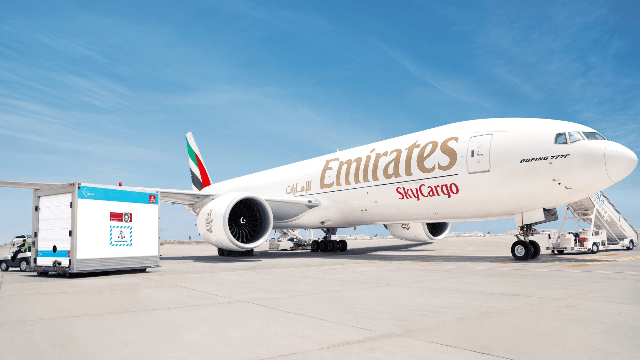Dubai-based Emirates and its dedicated airfreight division, Emirates SkyCargo, are currently evaluating new aircraft for future fleet development.
While 2023 may have been a dull year for cargo operators, Emirates is more optimistic about 2024. "The year has started very strong; we're seeing exceptionally high tonnages for this time of year compared to traditional past years, I'd say," said Nadeem Sultan, Emirates' senior vice president of cargo and freight planning, at the IATA World Cargo Symposium 2024 in Hong Kong this month. "From that point of view, it looks like a promising year for air cargo as a whole. We think we should probably expect overall growth of 1-2% in the airfreight market this year." "There will be a lot of aircraft capacity coming in - both passenger and freighter - over the next couple of years," said Sultan. "But we're also looking at really investing in the future of our airfreight infrastructure in Dubai, in terms of a new airfreight terminal and expansion of our current capacity. And that's something that will also be a key part of Emirates SkyCargo's future growth strategy."
Emirates is due to start taking delivery of some of its five new 777Fs this year, as part of an order placed with Boeing in 2022. The carrier has returned four 777Fs to lessor DAE Capital over the past five years, but also added two new units in May and June 2023, bringing its fleet to eleven 777Fs. The airline operated 13 777Fs until the pandemic.
Further growth is underway, with Emirates planning to convert ten 777-300ERs with IAI (Israel Aircraft Industries) at the Etihad Engineering facility. The first aircraft is due to arrive in 2024. The work includes, among other things, the addition of a main cargo deck door and the reinforcement of the cabin floor.
For future growth, the Airbus A350F and Boeing's 777-8F would be the main contenders, with the operator evaluating both against its requirements criteria in the coming years to operate alongside its fleet of current-generation Boeing 777-300Fs, as well as several of the carrier's existing passenger 777-300ERs which are to be converted to freighter configuration. The company said it anticipates the need for a long-haul freighter capable of carrying 110 to 120 tonnes. Increasing Emirates' main deck capacity on a fleet of dedicated freighter aircraft will also help it to feed the bellies of the wide-body aircraft the group has on order, according to lNadeem Sultan.
Meanwhile, while Emirates decides on its next step in terms of its future freighter needs, its closest neighbors have already made their choices in terms of new-generation wide-body aircraft. Abu Dhabi-based Etihad Airways has ordered seven A350Fs by 2022, while Doha-based Qatar Airways is the launch customer for the Boeing 777-8F, with a firm order for 34 aircraft.
Source: Air Journal

Comments0
Please log in to see or add a comment
Suggested Articles

